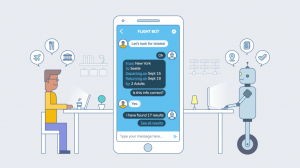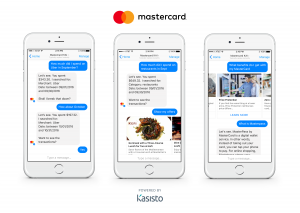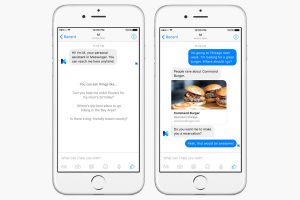Are chatbots changing the customer service industry?
Will chatbots revolutionize it in the future?
When it comes to chatbots and new technology such as AI and VR, there are a lot of unanswered questions. That’s because to most people, it’s something very new.
Customer service has always been an integral part of running a business venture. And throughout its long history, the discipline has remained largely unchanged. At its core, customer service was always concerned with a single goal – ensuring that the products and services which customers have purchased work as intended. In this sense, it may seem that there is little room for innovation in the field. After all, you will always have a customer or client submitting an issue on one side, and a customer service representative on the other, to provide the necessary information for solving it. However, with the advent of modern information technology, the customer service landscape is finally starting to evolve.

Customer service departments are now starting to bolster their ranks with a new kind of employee – the chatbot. These robotic conversation systems are enabling businesses to automate portions of their customer service operations. The technology is yet to see widespread use, but a number of businesses are already starting to reap the benefits of having a digital support rep. To find out more about how chatbots are impacting the customer service industry, take a look at our guide on the topic in the text below.
Customer Service on a Global Scale
What initially drove businesses to consider using chatbots in their customer service departments is their ability to provide 24/7 support on a global scale. This eliminates the need for having separate service reps for different regions and time zones. With a chatbot system in place, companies can expand their operations to new markets without having to hire additional personnel.
There are still bandwidth and computing power limitations to consider, but with the increasing availability of cheap hosting plans and affordable server hardware, they can be surmounted without much difficulty.

And with companies becoming more reliant on geographically diverse audiences to support their business model, the ability of chatbots to reach people on a global scale is making them indispensable for customer service departments.
Preemptive Support
One of the inherent limitations of traditional customer service models is the fact that you have to wait for customers to reach out in order to be able to provide support.
However, with the emergence of sophisticated, AI-powered chatbots, this limitation might soon become a thing of the past. To elaborate, a chatbot that has access to a sufficient amount of customer data might be able to detect problems before customers become aware of them.
This preemptive approach to customer service has the potential to automate the entire support process in the future. And as more products and services become reliant on maintaining a constant internet connection to provide full functionality, gathering relevant data for providing preemptive support will become even easier.
Lower Operating Costs
Maintain a fully-staffed customer service department requires a lot of company resources. Short-term expenses, such as purchasing office supplies and equipment, in combination with long-term obligations, such as providing training and paying salaries, can present significant barriers to setting up a customer service operation.

In contrast, a customer service chatbot has a comparatively modest impact on the company budget.
Setting up a chatbot is a one-time expense, and tech-savvy businesses owners can even do it at no additional cost just by following online tutorials. And once a chatbot is operational, it incurs no additional expenses apart from occasional maintenance.
For these reasons, chatbots are seeing more and more use in small businesses and startups as a cheaper alternative to having a dedicated customer service department.
Advanced Personalization
In today’s competitive online environment, businesses have to compete with a myriad of others of their kind to attain a critical mass of customers. One of the tactics which they use to appeal to consumers is to provide them with a personalized experience while they interact with their brand.
This approach is not limited to marketing – it can be utilized in the realm of customer service as well. To be more specific, customer service chatbots can now to offer each customer subtly different conversation experiences.
This is achieved by feeding chatbots a stream of data which includes chat logs, recorded conversations, and other types of personal information. With such data on hand, chatbots can dynamically alter their conversation patterns to better match the preferences of particular customers.
Improved Customer Engagement
Customer service is an integral part of a company’s branding efforts. Depending on how their customer service experience has gone, a customer will tend to perceive a brand in a more positive or negative light. One way to amplify these effects is to turn your chatbot into a mouthpiece for your brand. This can be accomplished by giving the customer service chatbot a name, a background story, and an official position in the company hierarchy.
In addition to providing customer support, chatbots of this sort can work as interactive guides for a brand. The success of projects such as Amazon’s Alexa and Microsoft’s Cortana are proof that giving chatbots a dose of personality can go a long way towards boosting customer engagement. You can also task chatbots with booking appointments, scheduling tasks, or even fill out applications – depending on what types of products and services your company provides.
Self-Service Provisions
Certain segments of any consumer base have an inherent dislike of contacting customer service. What they prefer instead is to have some form of self-service available for addressing their issues. Millennials and Generation Z are the two major demographic cohorts that are likely to utilize self-service options if given the opportunity.
Their exposure to digital technology from an early age has made them competent at figuring out tech-related problems. So instead of forcing them to go through an extended conversation with a customer service rep just to determine what is wrong, companies would be much better off by just giving them the opportunity to solve their issues on their own with assistance from a chatbot.
Conclusion
While the field of automated customer service is still very much in its infancy, its future potential shouldn’t be underestimated. Instead of being seen as replacing traditional customer service departments, chatbots should be treated as tools for helping human reps do their jobs more efficiently.


